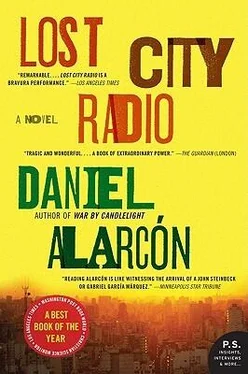It was just before morning, the truck chortling through the vacant, predawn streets. Every pothole shook the old truck like a tremor, but even so, Rey managed to doze off. There was no curfew yet, but it was quiet at that hour. Rey had learned that night of the fire to mistrust quiet: somewhere, something was burning. Of course. Of course — because the army had come to his town the next day to ask questions. Because his friends hadn’t come to his defense. Rey had assumed they’d come forward on their own, but they never did. They’d been afraid, or been told to keep quiet. Because Rey had spent that night asleep on the floor of the cell, wrapped in a blanket that left his feet exposed to the chill, his cheek on the dank floor of the jailhouse. He was a tall, lanky boy — a stupid boy, his father had said, but not a bad one.
When his anger had subsided, Rey’s father said, “We’ll have to leave, son.”
The thought made Rey impossibly sad. “Where will we go?” he asked, but of course he knew the answer. The city, the city: it’s where everyone went. They cried together, father and son, and then slept on the floor. Like criminals. It was the only safe place in town for them. Trini let the drunks go so that father and son could have the cell to themselves.
The mayor, affable and corrupt, stood outside with a crowd behind him. Trini begged them all to go home, said that it would all be settled in the morning. And it was: the green army trucks pulled over the ridge, unloading a division of soldiers ready to speculate with guns about the origins of the fire. They poked around the ashes of the mayor’s office and then through the home of the primary suspect, where even the soldiers remarked on his youth. The angry crowds hid in their homes, afraid to seem too interested, eager to let the authorities do their work. In Rey’s home, the soldiers found a few books on unsavory topics, espousing points of view that had been deemed dangerous in the capital, though the decree had never made it to Rey’s town.
They took Rey’s father in for questioning. He was released a week later, with a few bruises and a broken rib. Hadn’t Rey’s father taught that arrested man, the one found in the city in a house full of weapons? And how is it that a young man from this town of upstanding citizens was transformed into a criminal? And who was responsible for such a tragedy? Everywhere there were rumors. The school board said it was a shame they had to let Rey’s father go. They gave him two weeks to vacate the house they had rented him, and planned a modest party, which none of the teachers attended. Rey went, dressed in his suit, prepared to say good-bye to his father’s colleagues. He was seething. “They’re afraid, son,” Rey’s father said. “Don’t blame them.”
Now Rey felt the jab of a rifle in his gut. “Wake up, lover boy.” It was the soldier who had taken him off the bus. He was grinning.
Rey didn’t have it in him to protest. His neck hurt, and his temples throbbed. Stepping out of the truck, Rey could see it was morning. They weren’t in the city anymore, but in a completely empty place: a bleached, airless planet. The ground was brittle and flecked with glass, pockmarked with craters of all sizes that stretched ahead and all around him in the semidarkness. There were dunes and hills that he could just make out.
“Where are we?” Rey asked the soldier.
The soldier didn’t respond.
“The Moon,” said the bearded man in the wrinkled suit.
The prisoners were chained together in a group. “Walk straight ahead,” one of the soldiers said, “exactly in the footsteps of the man in front of you.”
The Moon is a minefield then, thought Rey. The man in the suit was chained in front of him, and he turned now, and smiled. He raised his chained hands and scratched his beard. “It’s easy for me,” he said. “I have small feet. It won’t be so easy for you.”
“I’ll be okay,” Rey said.
A shot rang out, not close by but somewhere in the distance. The procession paused for a second. There were the muffled, faraway sounds of people laughing.
“Have you been here before?” Rey asked the man in front of him.
The man bit his upper lip and nodded. “This is my second home.”
They walked, enchained, toward the horizon.
NORMA IS not a mother. Not in any sense, not remotely. In her apartment, there were two houseplants that could attest to this fact, houseplants whose dusty, dying leaves had bent hopefully and desperately toward light and were now in abject surrender, wilting and forgotten. She lived alone — not for herself, not selfishly, but alone. Her public life was the radio, where she was mother to an imaginary nation of missing people. Her private life was antiseptic and empty, a place for memory, music, and solitude. Norma, who was not a mother, couldn’t comfort a child suffering from a toothache, or discipline one who had broken a piece of china. She couldn’t brush tangled hair painlessly or sew a patch on the worn knee of a pair of pants. These things didn’t come naturally to her. She had no pets: not a clumsy dog clawing at the door for her; not a tabby cat waiting to emerge languidly from behind a bed frame, to acknowledge her with yellow eyes and then slink away. There were no living things to make demands of her except her dying plants, not in her solitary apartment, not since Rey had vanished, no one who asked to be fed, or who needed to be washed, no one who awoke, sweating furiously and shouting, from adolescent nightmares.
There he was then, her first lesson: that morning, before dawn, Victor awoke with a scream.
It was torture to summon those kinds of emotions, the kind mothers routinely have: heart-swelling sentiments of selfless love. It was hard enough to pretend on the radio each Sunday. How could she do it now? Her impulse was to shut her door, to block out the sound — only the door was already closed. There was no escaping him: a human being, a child and his pain invading her space. She rubbed her bleary eyes and rose.
She found the boy still shaken, spent with the force of his yelling, heaving and panting, shirtless and thin, eyes red, looking every bit an animal liberated from a zoo. “Victor,” she said. Norma felt she should touch him, but where? How? She put her hand on his head, and sat on the sofa — her sofa, hers and Rey’s — and the boy melted into her. It was natural, instinct: he didn’t hesitate at all. His hands clasped tightly around her. “It’s all right,” Norma said, “it was just a dream.” It was a phrase she’d heard before, in a movie or on one of the radio soap operas.
He was breathing heavily, and the beating of his heart shook him from the inside. She could feel him trembling.
REY DISAPPEARED, and she didn’t see him again for nearly a year. Norma took his ID card, with that strange, foreign-sounding name, and carried it with her. It felt dangerous to own it. She was curious. She should ask someone about it, she thought, one of their friends at the university, but just as quickly decided she couldn’t. It would be some sort of betrayal. The man had secrets, and she suspected they were what made Rey’s young face seem old. How dramatic it had all seemed, how exaggerated, the music and the lights and his absurd and self-important question. Then afterwards, once he had been taken away, the faces of the passengers on the bus, accusing her — rich girl, white girl, disturbing their morning commute with idiocies, putting all their lives in danger, teasing the soldier. It was somehow shameful, but what could she do now, he was gone, and Norma had only the memory of that night and a strange ID to remember him by. She was afraid to ask anyone if they had seen him or heard from him since the night of the party. She was afraid to tell anyone that he had been taken away, that she had seen it. In any case, she wasn’t sure whom she should tell.
Читать дальше












